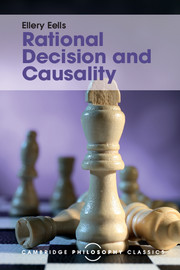Book contents
- Frontmatter
- Dedication
- Contents
- Preface to this edition
- Preface
- Introduction
- 1 Bayesianism
- 2 The philosophical and psychological significance of Bayesian
- 3 Bayesian decision theories: some details
- 4 The counterexamples
- 5 Causal decision theories
- 6 Common causes, reasons and symptomatic acts
- 7 A general defense of PMCEU
- 8 Newcomb's paradox
- Appendix 1 Logic
- Appendix 2 Probability
- Bibliography
- Index
7 - A general defense of PMCEU
Published online by Cambridge University Press: 05 July 2016
- Frontmatter
- Dedication
- Contents
- Preface to this edition
- Preface
- Introduction
- 1 Bayesianism
- 2 The philosophical and psychological significance of Bayesian
- 3 Bayesian decision theories: some details
- 4 The counterexamples
- 5 Causal decision theories
- 6 Common causes, reasons and symptomatic acts
- 7 A general defense of PMCEU
- 8 Newcomb's paradox
- Appendix 1 Logic
- Appendix 2 Probability
- Bibliography
- Index
Summary
The assumptions of the last chapter are idealizations, and they deal only with the special case of pure Newcomb situations. In this chapter, I will trade those assumptions for weaker ones relative to a more general setting with n states and m available acts. This more general setting may constitute a pure Newcomb situation, a mixed Newcomb situation or no Newcomb situation at all. After giving a probabilistic analysis of an agent's beliefs regarding the causal relations among the acts, the states and states of a special kind (like RФ(DM) of Chapter 6), I shall offer two theorems which indicate that PMCEU gives the right prescription wherever causal decision theory does. The main argument of this chapter will appeal to the plausibility of causal decision theory – in particular, PMKE – when its causal expectation is evaluated relative to appropriate partitions, in the sense of ‘appropriate’ given in Chapter 5. But before proceeding to the more general setting, I shall consider a kind of objection that might be made to the analysis of Chapter 6 to which the theory of this chapter provides an answer.
The “tickle defense”
Skyrms discusses a kind of defense of PMCEU which has come to be known as the “tickle defense” (1980a: 130–2). Consider again the cholesterol case. If the way in which the lesion caused high cholesterol intake was by producing a detectable tickle of a certain kind in the taste buds and if the agent knew this and noticed whether or not he had that tickle, then obviously PMCEU would give the correct prescription: the man would know whether or not he had the lesion and, either way, PMCEU would clearly recommend the eggs benedict. This is because having the tickle (and thus the lesion) – or not having the tickle (and thus not having the lesion) – screens off the causal, and thus the probabilistic, correlation between high cholesterol intake and hardening of the arteries: given the tickle – or given its absense – the probability of atherosclerosis is the same conditional on high cholesterol intake and conditional on low to medium cholesterol intake. And if the counterpart of the tickle exists for the other Newcomb situations, then PMCEU will give the right answers there as well.
- Type
- Chapter
- Information
- Rational Decision and Causality , pp. 155 - 187Publisher: Cambridge University PressPrint publication year: 2016

